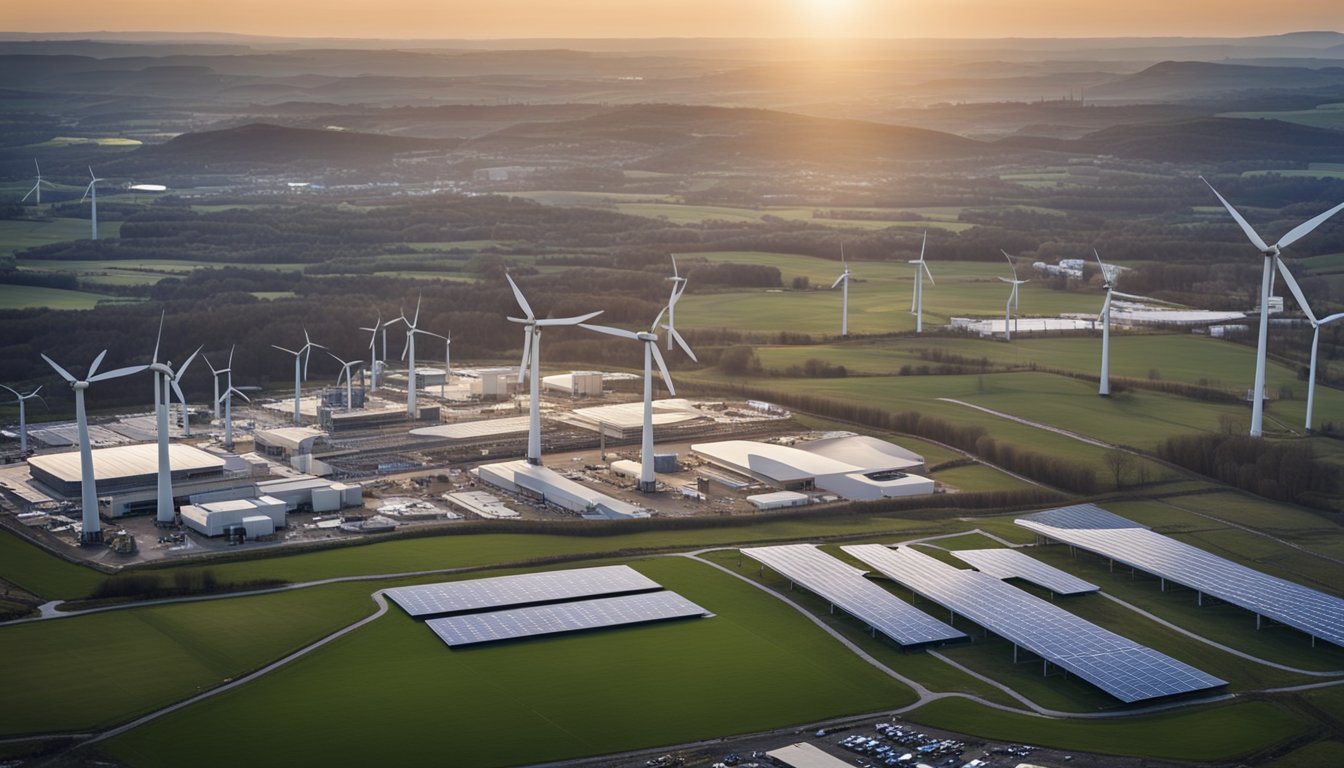Late updated: 31 Oct 2024 12:10
Written by: Amber Collins
Enhancing UK Business Growth Through Renewable Energy Solutions: A Path to Sustainability
The United Kingdom stands at a pivotal moment in its energy landscape, with renewable energy solutions at the forefront of business growth and sustainable development. As UK businesses confront increasing energy costs and environmental challenges, adopting greener energy strategies becomes both a necessity and an opportunity. Our commitment to renewable energy not only addresses environmental concerns but also fuels economic growth and innovation across various industries.

The emergence of new technologies and government initiatives is streamlining processes such as grid connections, significantly reducing delays from five years to six months. This acceleration facilitates quicker access to renewable resources, enabling businesses to expand their operations sustainably. Alongside this, calls for reform in the electricity market emphasise the importance of transparency and investment in renewable energy, underscoring our role in shaping a greener economy.
By embracing renewable energy, UK businesses can harness untapped potential, driving growth and competitiveness on a global scale. This strategic shift not only supports the transition to a low-carbon future but also provides an edge in attracting investors and customers who value sustainability.
Key Takeaways
- Renewable energy is key to UK business growth and sustainability.
- Expedited grid connections enhance access to renewable energy.
- Transparency and investment reforms shape the UK’s green economy.
Strategic Framework for Renewable Energy in the UK
Our strategic framework for renewable energy in the UK focuses on legislative measures, investment dynamics, and the impact of a greener energy mix. Each element is crucial in driving a sustainable transition, combining efforts to meet national commitments and enhance economic growth.
Legislation and Government Initiatives
The UK government has implemented robust legislation to facilitate the energy transition. Notable is the Climate Change Act, which establishes legally binding carbon reduction targets. Additionally, initiatives like the Green Deal Industrial Plan and the Paris Agreement influence our national strategy.
Programmes such as the Energy Security Bill support a shift towards renewable electricity, enhancing solar power, bioenergy, and wind energy capabilities. By aligning policy with innovation, the government encourages technological advancements and market adaptation in clean energy technologies.
Public and Private Investment Dynamics
Investment in renewable energy involves a mix of public funding and private sector participation. Government-backed schemes provide crucial financing for projects related to solar, wind, and bioenergy technologies. They're essential for driving the Green Industrial Revolution and ensuring energy security.
Private investments are pivotal, as they bring in necessary funds to scale up projects. Partnerships have emerged as effective models, where public incentives and private capital collaboratively drive the sector's growth. This synergy catalyses economic development and underlines our commitment to decoupling GDP growth from carbon emissions.
Impact of a Greener Energy Mix
Transitioning to a greener energy mix influences both ecological and economic outcomes. Renewable electricity now constitutes a significant portion of our national energy supply, reducing dependence on fossil fuels. Decarbonization efforts are supported by a diverse energy portfolio, including solar and nuclear electricity, enhancing sustainability.
This shift not only mitigates climate change impacts but also strengthens global competitiveness. A sustainable energy system attracts investments, supports economic resilience, and creates green jobs. In embracing an environmentally responsible approach, we support long-term growth and stability, fostering a thriving renewable energy sector.
Harnessing Renewable Energy for Business Expansion

Renewable energy presents substantial opportunities for businesses in the UK to leverage advanced technologies for sustainable growth. By integrating green solutions like clean hydrogen, offshore wind, and energy efficiency measures, companies can significantly enhance their economic performance, improve energy security, and reduce greenhouse gas emissions.
Adoption of Cutting-Edge Renewables
Embracing renewables such as offshore wind power and clean hydrogen can drive growth for businesses, especially small and medium-sized enterprises (SMEs). Technologies like electric vehicles and heat pumps are reshaping operational efficiency. Investments in green technologies can reduce emissions and enhance a company's market position by meeting growing consumer and investor demand for sustainability.
Maximising the use of renewables helps companies cut costs long-term by reducing reliance on fossil fuels. This strategy supports our green business commitments, aligning with national objectives for emissions reduction and sustainable development.
Driving Economic Advantages
Renewable energy adoption offers distinct economic benefits. By integrating renewables into supply chains, businesses can achieve a comparative advantage, access to new markets, and enhanced resilience against energy price hikes. Investing in these technologies can foster job creation within manufacturing and related sectors, further stimulating economic growth.
Government incentives and subsidies for green technology adoption further bolster returns on investment. By leveraging these financial benefits, we can accelerate our transition to cleaner energy systems without compromising competitiveness.
Enhancing Energy Security and Efficiency
Strengthening UK energy security and improving energy efficiency are critical priorities. Implementing energy efficiency measures alongside renewable energy solutions enhances resilience and ensures businesses are better equipped to handle demand fluctuations.
Energy storage technologies and efficient grid integration are pivotal to managing intermittent renewable sources. By using advanced energy storage solutions, we can ensure a stable power supply, reducing vulnerabilities linked to traditional energy sources. Additionally, bridging the skills gap in green technologies will empower our workforce and sustain industry development.
These comprehensive strategies enable us to capture the full potential of renewable energy, resulting in both increased energy efficiency and reduced greenhouse gas emissions.
Frequently Asked Questions

Our focus is on the economic benefits businesses can reap by investing in renewable energy. We'll explore government incentives available, the challenges faced, and potential growth sectors within the UK.
How does the adoption of renewable energy impact economic growth in the UK?
Renewable energy adoption can drive significant economic growth for UK businesses. It reduces operational costs and enhances energy security, making businesses more competitive. Additionally, it stimulates job creation in sectors such as technology, manufacturing, and services related to renewable energy.
What incentives are currently available for UK businesses investing in renewable energy?
The UK government provides various incentives to encourage businesses to invest in renewable energy. These include grants, tax reliefs, and feed-in tariffs. These programmes aim to reduce the initial investment cost and foster a transition to cleaner energy solutions.
To what extent does renewable energy contribute to the UK's energy independence?
Renewable energy significantly enhances the UK's energy independence. By reducing reliance on imported fossil fuels, the UK can control its energy supply better and stabilise energy costs. This shift not only contributes to national security but also positively impacts businesses by ensuring a more reliable energy supply.
What are the challenges faced by British businesses in transitioning to renewable energy?
Transitioning to renewable energy presents various challenges. Businesses often face high initial costs, regulatory hurdles, and technology integration issues. Additionally, the lack of adequate infrastructure and expertise can impede the seamless adoption of renewable solutions.
Which sectors in the UK show the most promise for renewable energy expansion?
The sectors showing the most promise include manufacturing, technology, and transport. These industries are actively investing in solar, wind, and bioenergy technologies. Innovations in these areas not only support sector-specific growth but also contribute to broader economic and environmental goals.
How does the UK government's environmental policy support business growth in the renewable energy sector?
The government's environmental policy provides a supportive framework for growth, backed by legislation and financial incentives. Policies encouraging carbon reduction and investments in green technology are instrumental in propelling business growth. Grants and support schemes play a crucial role in facilitating renewable energy projects across different sectors.
